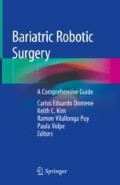Abstract
Training in robotic surgery includes observation of videos of robotic surgeries, watching live surgeries, dry and wet labs, and also simulation with the various Da Vinci simulators available. These devices are described, with advantages and disadvantages. Training skills in simulators is key for adequate development of robotic surgery ideal performances.
Access this chapter
Tax calculation will be finalised at checkout
Purchases are for personal use only
References
Julian D, Tanaka A, Mattingly P, et al. A comparative analysis and guide to virtual reality robotic surgical simulators. Int J Robot Comp Assist Surg. 2017; https://doi.org/10.1002/rcs.1874.
Mangano A, Gheza F, Giulianotti PC. Virtual reality simulator systems in robotic surgical training. Surg Technol Int. 2018;32:19–23.
Hung AJ, Chen J, Gill IS. Automated performance metrics and machine learning algorithms to measure surgeon performance and anticipate clinical outcomes in robotic surgery. JAMA Surg. 153(8):770–1. [Published online June 20, 2018].
Veronesi G, Dorn P, Dunning J, et al. Outcomes from the Delphi process of the Thoracic Robotic Curriculum Development Committee. Eur J Cardiothorac Surg. 2018;53(6):1173–9.
White J, Sharma A. Development and assessment of a transoral robotic surgery curriculum to train otolaryngology residents. ORL J Otorhinolaryngol Relat Spec. 2018;80:69–76.
Bertolo R, Garisto J, Dagenais J, et al. Single session of robotic human cadaver training: the immediate impact on urology residents in a teaching hospital. J Laparoendosc Adv Surg Tech A. 2018; https://doi.org/10.1089/lap.2018.0109.
Schlottmann F, Patti MG. Novel simulator for robotic surgery. J Robotic Surg. 2017;11(4):463–5.
Ballas D, Cesta M, Roulette GD, et al. Emergency undocking in robotic surgery: a simulation curriculum. J Vis Exp. 2018;(135):e57286. https://doi.org/10.3791/57286.
Cumpanas AA, Bardan R, Ferician OC, Latcu SC, et al. Does previous open surgical experience have any influence on robotic surgery simulation exercises? Wideochir Inne Tech Maloinwazyjne. 2017;12(4):366–71.
George LC, O’Neill R, Merchant AM. Residency training in robotic general surgery: a survey of program directors. Minim Invasive Surg. 2018; https://doi.org/10.1155/2018/8464298.
Mehta A, Patel S, Robison W, Senkowski T, et al. Can teenage novel users perform as well as general surgery residents upon initial exposure to a robotic surgical system simulator? J Robotic Surg. 2017; https://doi.org/10.1007/s11701-017-0715-z.
Watkinson W, Raison N, Abe T, et al. Establishing objective benchmarks in robotic virtual reality simulation at the level of a competent surgeon using the RobotiX Mentor simulator. Postgrad Med J. 2018;94(1111):270–7.
Melich G, Pai A, Shoela R, Kochar K, et al. Rectal dissection simulator for da Vinci surgery: details of simulator manufacturing with evidence of construct, face, and content validity. Dis Colon Rectum. 2018;61:514–9.
Lee GI, Lee MR. Can a virtual reality surgical simulation training provide a self-driven and mentor-free skills learning? Investigation of the practical influence of the performance metrics from the virtual reality robotic surgery simulator on the skill learning and associated cognitive workloads. Surg Endosc. 2017; https://doi.org/10.1007/s00464-017-5634-6.
Raison N, Ahmed K, Abe T. et al, Cognitive training for technical and non-technical skills in robotic surgery: a randomised controlled trial. BJU Int. https://doi.org/10.1111/bju.14376.
Yang K, Zhen H, Hubert N, et al. From dV-Trainer to real robotic console: the limitation of robotic skill training. J Surg Education. 2017;74(6):1074–80.
Mills JT, Hougen HY, Bitner D, et al. Does robotic surgical simulator performance correlate with surgical skill? J Surg Educ. 2017;74(6):1052–6.
Kwong JCC, Lee JY, Goldemberg MG. Understanding and assessing nontechnical skills in robotic urological surgery: a systematic review and synthesis of the validity evidence. J Surg Educ. 2018; https://doi.org/10.1016/j.surg.2018.05.009.
Havemann MC, Dalsgaard T, Sørensen JL, et al. Examining validity evidence for a simulation-based assessment tool for basic robotic surgical skills. J Robot Surg. 2018; https://doi.org/10.1007/s11701-018-0811-8.
Author information
Authors and Affiliations
Editor information
Editors and Affiliations
Rights and permissions
Copyright information
© 2019 Springer Nature Switzerland AG
About this chapter
Cite this chapter
Volpe, P., Domene, C.E. (2019). Training in Robotic Surgery. In: Domene, C., Kim, K., Vilallonga Puy, R., Volpe, P. (eds) Bariatric Robotic Surgery. Springer, Cham. https://doi.org/10.1007/978-3-030-17223-7_5
Download citation
DOI: https://doi.org/10.1007/978-3-030-17223-7_5
Published:
Publisher Name: Springer, Cham
Print ISBN: 978-3-030-17222-0
Online ISBN: 978-3-030-17223-7
eBook Packages: MedicineMedicine (R0)

